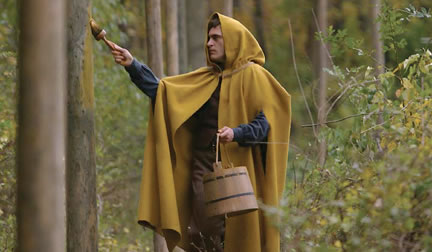Note: This review also appears at Blogcritics.org
As stated in an earlier review of this movie M Night Shyamalan is one of the few directors, if not the only director, in Hollywood whose movies are a draw simply because of him. Most of his movies, except for The Sixth Sense downplayed the leading actors, and instead focused on the director. Not since Alfred Hitchcock has there been a director with that sort of following.
In his latest film, The Village, Shyamalan delivers a movie that continues in his tradition of creepiness.
In the opening scene we see a father, distraught over the casket of a loved one, his young son who died of an apparent illness. In the background from reading the date on the headstone we learn that the year is 1897.
 | The village they live in is surrounded by woods in which "Those who we do not speak of" live. The monsters are attracted by the color red, and scared away with yellow. When a red flower is seen, people quickly pluck it and bury it, to hide it away from the monsters. The people of the village live in fear of these hardly seen, though often heard monsters. They never enter the forest, for that is the land of the beasts. The beings in the forest therefore do not enter the village. That is the conditions of the truce between the villagers and the monsters. |
The village is a sort of utopian society. There is no money, and everyone works together to grow food, build houses, and keep the village going. We are told through the movie that they came here to get away from the harshness of the towns. Most every house has a locked box, where reminders of their past are locked away, to remind those who originally came to the village why they moved here.
Lucius Hunt, played by Joaquin Phoenix offers to go into the towns to get medicine so that the people like the young boy whose funeral we saw at the beginning of the film, won't have to die due to lack of health care. He asks the elders for permission to enter the woods, and they refuse.
Ivy Walker, played by Bryce Dallas Howard, the blind daughter of lead elder Edward Walker, played William Hurt, is the love interest of Lucius. Though blind, her connection to Lucius is so strong that she sees a color emanate from him. Her father is the only other one she can "see".
The monsters in the woods soon appear to be less willing to value the truce, as one morning most of the village livestock are found skinned alive, and red slashes are found on the doors to the houses.
When a tragedy happens, Edward grants permission for Ivy to enter the woods to go to the towns to get medicine, which sets up a confrontation and conclusion where everything is explained, and nothing is as it seems.
This movie, shot in Pennsylvania, is a beautifully shot piece of work. The look is very agrarian and pioneer, like something out of a history book about Jamestown or Plymouth Rock. The lack of red in the movie and prevalence of yellow give the whole town a sort of toned down earth tone look to it.
Though taking place in 1897 the town has a sort of pre-industrial look to it. We see no items or references to turn of the century America. It appears as if their utopian society is part Quaker, part Shaker, and part Amish.
The star of the film is Bryce Dallas Howard, daughter of director Ron Howard, who gives an Oscar caliber performance. Her face at times appears young and childlike, reflecting the innocence of the town she lives in. Other times she appears much older and hardened, secure of herself in times when she needs to be tough.
The other characters, even Phoenix, are there mainly for the support and the story develops around her. She becomes a catalyst for the story to move forward, and her character becomes a metaphor for the entire village; living in isolation, blind to the outside world.
One thing about Shyamalan, which is both a blessing and a curse, is that his movies are getting known to have twist or surprise endings. People have come to expect that and are disappointed when the twist doesn't measure up to their expectations of the movie.
The weakness in the movie is that it is marketed as a horror movie, which it is not. Though there are occasional scares and places to make you jump, the movie is more about how the villagers view themselves and the outside world.
There are two major plot twists in the film. Though not entirely shocking, they are framed in such a way that you only see a little bit at a time over many long minutes. This gives you a little view at a time, like trying to guess what a wrapped present is. First you shake, then you pull the wrapping away a bit at a time until the whole thing is exposed. Sometimes you guess right from the start, and sometimes even those little peeks don't give you the full answer until you have the whole thing unwrapped.
Originally titled The Woods the name was changed to shift focus back onto the center point of the story, the village. Rightfully so, because this movie isn’t about what lurks in the woods, or what is beyond that place that we are comfortable, but is about how we sometimes lock ourselves in. To protect us from what see as real threats and what we think may real hurt us. And sometimes those same fears are different to different people.
Four out of Five Stars.
Posted by psugrad98 at July 31, 2004 10:25 AMGreat writing, Tom. Excellent review; now I HAVE to see the film!
Posted by: Tuning Spork at August 1, 2004 08:05 PM